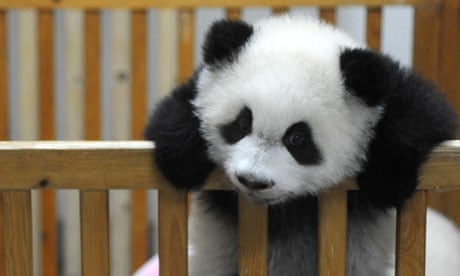The death of a giant panda in captivity in Japan has caused something of a diplomatic stink. Apart from eating bamboo, this is something that pandas are very good at.
China's State Forestry Administration, which officially "owns" the animal, has ordered the keepers at Oji zoo in Kobe, Japan not to interfere with the panda's corpse until a crack team of Chinese experts arrives to investigate.
This tough talk has caused some eyebrows to be raised in the west. But only by those who fail to appreciate the immense importance of the panda to modern China.
Quite surprisingly, China showed little interest in this beautiful, rare and exclusively Chinese animal until the Chinese Communist party came to power. It was only then that the panda began to emerge as a "national treasure" almost synonymous with the Chinese nation itself. In a forthcoming book Panda Nation: Nature, Science, and Nationalism in the People's Republic of China, American historian Elena Songster argues that one of the reasons the panda was such a suitable emblem for the bold, new state was that it was completely free of associations with China's imperial past. Indeed, there are no known representations of the panda in Chinese art before the 20th century. So while many subjects were off limits for artists during China's turbulent cultural revolution, the panda was not, says Songster.
Another great feature of the panda, at least as far as Chairman Mao Zedong and his followers were concerned, was that the rest of the world, particularly the west, had become obsessed by its excruciatingly cute looks and behaviour. So between 1957 and the 1980s, the CCP gave more than 20 pandas as gifts to around 10 different countries, including Britain. Since the late 1990s, China has been offering pairs of pandas to foreign zoos on long-term research loans. In exchange, China demands about $500,000 per pair per year over a 10-year period, money it must use to benefit wild pandas.
Nevertheless, China will sometimes still deploy pandas for overtly political purposes. In 1999, a few years after the British handed Hong Kong back to the Chinese, the PRC gifted the region a couple of pandas and followed them up with another pair to mark the 10th anniversary of Hong Kong's return to Chinese sovereignty. In 2008, after several earlier offers, Taiwan finally accepted a panda gift from China. The names of the animals, Tuan-Tuan and Yuan-Yuan, meaning "reunion", caused a considerable stir in Taiwan.
There is at least one precedent for this latest panda-related controversy unfolding in Japan. In 2007, a female panda that had been on loan from China to Germany for more than a decade died unexpectedly in Berlin Zoo. The postmortem, conducted by German vets, pronounced that she'd suffered a heart failure as a result of acute constipation. When China did not accept the verdict and demanded compensation, the zoo invited in a delegation to conduct their own investigation. The Chinese never took up this offer, says the zoo, and the dead panda is still on ice in the mortuary.
In the Japanese case, China appears to be asserting itself more forcefully. There are probably several reasons for this: it is likely to have learned from the episode with Germany; the historical confrontations between China and Japan are almost certainly cranking up the tensions; and China, with the panda as its cuddly face, is prepared to show increasing swagger on the global stage.
